|
Books Should Be Free Loyal Books Free Public Domain Audiobooks & eBook Downloads |
|
|
Books Should Be Free Loyal Books Free Public Domain Audiobooks & eBook Downloads |
|
Essay/Short Nonfiction |
|---|
|
Book type:
Sort by:
View by:
|
By: Francis Bacon (1561-1626) | |
|---|---|
 The Essays of Francis Bacon
The Essays of Francis Bacon
Among the many ideas explored in this book are beauty, gardens, honor and reputation, cunning, nobility, friendship and many others. Authored by the man who is credited with having invented the essay form in English, The Essays of Francis Bacon was written over an extended period, ranging from the mid sixteenth century. They were compiled in a single edition in 1597 and later re-written, enlarged and added to in other editions in 1612 and 1625. However, their compelling and insightful quality still appears fresh and appealing to modern day readers... | |
By: Francis Pharcellus Church (1839-1906) | |
|---|---|
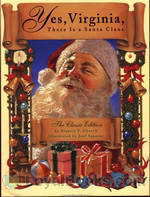 Yes, Virginia, There Is A Santa Claus
Yes, Virginia, There Is A Santa Claus
“Is There A Santa Claus?” was the headline that appeared over an editorial in the September 21, 1897 edition of the New York Sun. The editorial, which included the response of “Yes, Virginia, There is a Santa Claus,” has become an indelible part of popular Christmas lore in the United States. | |
By: Frank Gelett Burgess (1886-1951) | |
|---|---|
 Romance Of The Commonplace
Romance Of The Commonplace
Thirty four whimsical, tongue-in-cheek, and entertaining essays about not much in particular, published in 1902, by one of the most popular writers of the late nineteenth and early twentieth centuries. The American Gelett Burgess was an artist, art critic, poet, author, and humorist. Nonsense verse was a specialty. - Summary by David Wales | |
By: Frank W. Boreham (1871-1959) | |
|---|---|
 Silver Shadow, and Other Day Dreams
Silver Shadow, and Other Day Dreams
Frank Boreham was a well known preacher who served in England, Australia, and New Zealand. He published dozens of books and thousands of editorials during his lifetime, with no sign of slowing down, even up until his death at age 88. He wrote with a distinctive style, seeming to be able to draw a spiritual lesson out of any conceivable topic. Boreham admits that this volume is but a collection of his reflections on things. But he hopes that by viewing the reflections, we will be more apt to take notice of the things themselves than if we had looked directly at them in full light of day. - Summary by Devorah Allen | |
By: Friedrich Kerst | |
|---|---|
 Mozart, The Man and the Artist as Revealed in His Own Words
Mozart, The Man and the Artist as Revealed in His Own Words
Wolfgang Amadeus Mozart. His name is one of the most recognizable names in history and one of the most enduring of composers. At age 5, this “wunderkinder” took to the stage and began his life as a prolific and celebrated creator-genius of such luminous works the world has not known since. This collection of morsels taken from his personal letters is engaging and gives a look into the mind of the boy wonder. Was he mad? Was he miraculous? | |
By: Friedrich Nietzsche (1844-1900) | |
|---|---|
 Case of Wagner / Nietzsche Contra Wagner / Selected Aphorisms
Case of Wagner / Nietzsche Contra Wagner / Selected Aphorisms
A collection of three of Nietzsche's writings concerning the music of Wagner. In particular, he relates Wagner's music as degenerate, unrefined and unintelligent and relates it to a gradually degenerating German culture and society. The translator provides a detailed introduction. | |
 Complete Works of Friedrich Nietzsche: Volume 3
Complete Works of Friedrich Nietzsche: Volume 3
Volume 3 of the complete works contains several short critical introductory essays, five lectures under the heading "On the Future of our Educational Institutions," and finally an essay by the author entitled "Homer and Classical Philology." As always, Nietzsche believes in the importance of classical thought. | |
By: Friedrich von Hügel (1852-1925) | |
|---|---|
 Essays and Addresses on the Philosophy of Religion
Essays and Addresses on the Philosophy of Religion
Baron Friedrich von Hugel was a lay Catholic theologian whose work was influential during the rise of modernist thought. His Essays and Addresses on the Philosophy of Religion became a favorite work of later Christian writers C.S. Lewis and Flannery O'Connor. The book compiled previously written material into a single collection, divided into three parts: the first, on religion and theism in general; the second, on Christ's teachings and Christianity in general; the third, on the Catholic Church. - Summary by Dylan P. Straub | |
By: G. K. Chesterton | |
|---|---|
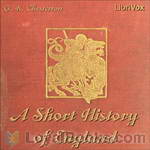 A Short History of England
A Short History of England
Gilbert Keith Chesterton was a prolific writer on many topics. His views of history were always from the standpoint of men and their interactions, and it may fairly be said he saw all of history as a battle between civilization and barbarism. So it has always been, and that remains true even today.“But it is especially in the matter of the Middle Ages that the popular histories trample upon the popular traditions. In this respect there is an almost comic contrast between the general information... | |
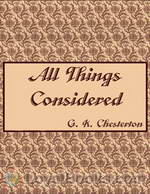 All Things Considered
All Things Considered
Another delightful and sharply pointed excursion into the topics of the day, and of this day as well, with Gilbert Keith Chesterton. These reprinted magazine articles are filled with his good natured wit, his masterful use of paradox, and devastating ability to use reductio ad absurdum to destroy the popular myths that drive a society driving full-speed into secular humanism. You will come away with a whole new collection of wonderful quotes. (Ray Clare) | |
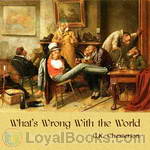 What's Wrong With the World
What's Wrong With the World
Gilbert Keith Chesterton (1874–1936) has been called the “prince of paradox.” Time magazine observed of his writing style: “Whenever possible Chesterton made his points with popular sayings, proverbs, allegories—first carefully turning them inside out.” His prolific and diverse output included journalism, philosophy, poetry, biography, Christian apologetics, fantasy and detective fiction. The title of Chesteron’s 1910 collection of essays was inspired by a title given to him two years earlier by The Times newspaper, which had asked a number of authors to write on the topic: “What’s wrong with the world?”... | |
 Eugenics and Other Evils
Eugenics and Other Evils
Most Eugenists are Euphemists. I mean merely that short words startle them, while long words soothe them. And they are utterly incapable of translating the one into the other, however obviously they mean the same thing. Say to them “The persuasive and even coercive powers of the citizen should enable him to make sure that the burden of longevity in the previous generation does not become disproportionate and intolerable, especially to the females”; say this to them and they will sway slightly to and fro like babies sent to sleep in cradles. Say to them “Murder your mother,” and they sit up quite suddenly. Yet the two sentences, in cold logic, are exactly the same.” | |
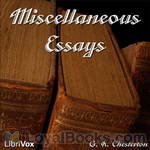 Miscellaneous Essays
Miscellaneous Essays
These nine files are miscellaneous short essays or stories from G. K. Chesterton. They were chosen for not only their brevity but also for being shining exemplars of Chesterton’s wit and whimsy. A fun but powerful introduction into the mind of the man that is G. K. Chesterton. | |
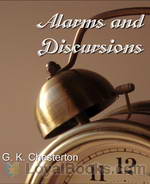 Alarms and Discursions
Alarms and Discursions
Gilbert Keith Chesterton was an influential English writer of the early 20th century. His prolific and diverse output included journalism, philosophy, poetry, biography, Christian apologetics, fantasy, and detective fiction. Chesterton has been called the “prince of paradox.” He wrote in an off-hand, whimsical prose studded with startling formulations. Chesterton wrote about 4000 essays on various subjects, and “Ararms and Discursions is one of his collections. | |
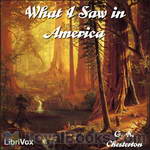 What I Saw in America
What I Saw in America
“Let me begin my American impressions with two impressions I had before I went to America. One was an incident and the other an idea; and when taken together they illustrate the attitude I mean. The first principle is that nobody should be ashamed of thinking a thing funny because it is foreign; the second is that he should be ashamed of thinking it wrong because it is funny.” (Gilbert Keith Chesterton) | |
 The New Jerusalem
The New Jerusalem
“On the road to Cairo one may see twenty groups exactly like that of the Holy Family in the pictures of the Flight into Egypt; with only one difference. The man is riding on the ass.” “The real mistake of the Muslims is something much more modern in its application than any particular passing persecution of Christians as such. It lay in the very fact that they did think they had a simpler and saner sort of Christianity, as do many modern Christians. They thought it could be made universal merely by being made uninteresting... | |
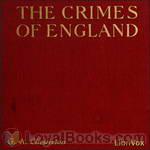 The Crimes of England
The Crimes of England
“Second, when telling such lies as may seem necessary to your international standing, do not tell the lies to the people who know the truth. Do not tell the Eskimos that snow is bright green; nor tell the negroes in Africa that the sun never shines in that Dark Continent. Rather tell the Eskimos that the sun never shines in Africa; and then, turning to the tropical Africans, see if they will believe that snow is green. Similarly, the course indicated for you is to slander the Russians to the English and the English to the Russians; and there are hundreds of good old reliable slanders which can still be used against both of them... | |
 The Defendant
The Defendant
A collection of reprinted articles on a wide-range of subject, all in the unique style of G. K. Chesterton. Using wit, paradox, and good humor he “defends” a series of seeming harmless things that need no defense, and in so doing he exposes many of the broken assumptions and dogmatic notions of secular humanism and other trends of his age and of ours. | |
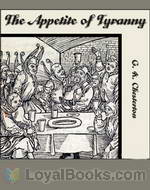 The Appetite of Tyranny
The Appetite of Tyranny
“Unless we are all mad, there is at the back of the most bewildering business a story: and if we are all mad, there is no such thing as madness. If I set a house on fire, it is quite true that I may illuminate many other people’s weaknesses as well as my own. It may be that the master of the house was burned because he was drunk; it may be that the mistress of the house was burned because she was stingy, and perished arguing about the expense of the fire-escape. It is, nevertheless, broadly true that they both were burned because I set fire to their house. That is the story of the thing. The mere facts of the story about the present European conflagration are quite as easy to tell.” | |
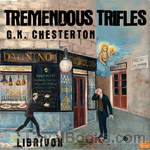 Tremendous Trifles
Tremendous Trifles
“None of us think enough of these things on which the eye rests. But don’t let us let the eye rest. Why should the eye be so lazy? Let us exercise the eye until it learns to see startling facts that run across the landscape as plain as a painted fence. Let us be ocular athletes. Let us learn to write essays on a stray cat or a coloured cloud. I have attempted some such thing in what follows; but anyone else may do it better, if anyone else will only try. ” (Gilbert Keith Chesterton) | |
 Varied Types
Varied Types
Another delightful and sharply pointed excursion into the topics of the day, and of our day as well, with Gilbert Keith Chesterton. Here he uses his wit and mastery of paradox to bring into focus a number of historical persons who in many ways typify the people who presently shape our world and who in their own right have already shaped Western civilization. These reprinted magazine articles are filled with his good natured wit and devastating ability to use reductio ad absurdum to destroy the popular myths that drive our society at full-speed into, and expose the utter nonsense that underlies, secular humanism. You will come away with yet another new collection of wonderful quotes. | |
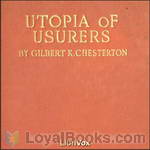 A Utopia of Usurers
A Utopia of Usurers
“Now I have said again and again (and I shall continue to say again and again on all the most inappropriate occasions) that we must hit Capitalism, and hit it hard, for the plain and definite reason that it is growing stronger. Most of the excuses which serve the capitalists as masks are, of course, the excuses of hypocrites. They lie when they claim philanthropy; they no more feel any particular love of men than Albu felt an affection for Chinamen. They lie when they say they have reached their position through their own organising ability... | |
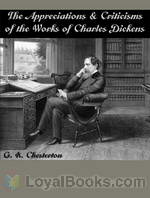 The Appreciations and Criticisms of the Works of Charles Dickens
The Appreciations and Criticisms of the Works of Charles Dickens
“These papers were originally published as prefaces to the separate books of Dickens in one of the most extensive of those cheap libraries of the classics which are one of the real improvements of recent times. Thus they were harmless, being diluted by, or rather drowned in Dickens. My scrap of theory was a mere dry biscuit to be taken with the grand tawny port of great English comedy; and by most people it was not taken at all–like the biscuit. Nevertheless the essays were not in intention so aimless as they appear in fact... | |
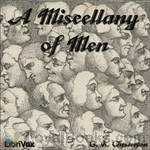 A Miscellany of Men
A Miscellany of Men
Gilbert Keith Chesterton was among the world’s most prolific writers who incorporated relentless logic, wonderful humor, and a clear view of truth into an amazing tool for exposing the foolishness of the policies of the world around him through the device of paradox.It is always great fun, and certainly always a learning experience to read Chesterton. A Miscellany of Men may be his hardest work to define, as it deals with a huge array of issues, using “personal types” as illustration. It would... | |
 Irish Impressions
Irish Impressions
“For the Irish Question has never been discussed in England. Men have discussed Home Rule; but those who advocated it most warmly, and as I think wisely, did not even know what the Irish meant by Home. Men have talked about Unionism; but they have never even dared to propose Union. A Unionist ought to mean a man who is not even conscious of the boundary of the two countries; who can walk across the frontier of fairyland, and not even notice the walking haystack. As a fact, the Unionist always shoots at the haystack; though he never hits it... | |
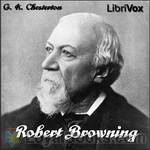 Robert Browning
Robert Browning
There is an old anecdote, probably apocryphal, which describes how a feminine admirer wrote to Browning asking him for the meaning of one of his darker poems, and received the following reply: “When that poem was written, two people knew what it meant–God and Robert Browning. And now God only knows what it means. | |
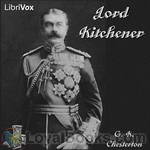 Lord Kitchener
Lord Kitchener
“The paradox of all this part of his life lies in this–that, destined as he was to be the greatest enemy of Mahomedanism, he was quite exceptionally a friend of Mahomedans.” | |
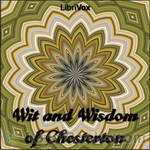 Wit and Wisdom of Chesterton
Wit and Wisdom of Chesterton
In this collection, Bevis Hillier has put together some of Chesterton's essays in "The Defandant", "Varied Types" and "Tremendous Trifles". These 12 pieces were chosen to giving a peek into the margins of Chesterton's work and give a sense of the distinctive flavor of his mind. They were also chosen with an eye to showing what a complex and fascinating character he was. | |
 G. K. Chesterton's Newspaper Columns: The New Witness - 1921
G. K. Chesterton's Newspaper Columns: The New Witness - 1921
A collection of the newspaper columns/essays written by G.K. Chesterton for "The New Witness", under the heading "At the Sign of the World's End". This project compiles the articles from 1921 | |
 G.K. Chesterton's Newspaper Columns: The New Witness - 1922
G.K. Chesterton's Newspaper Columns: The New Witness - 1922
A collection of the newspaper columns/essays written by G.K. Chesterton for "The New Witness", under the heading "At the Sign of the World's End". This project compiles articles from 1922. | |
 Uses of Diversity
Uses of Diversity
A collection of 35 essays by G.K. Chesterton originally published in his weekly columns in "The Illustrated London News" and the "New Witness". The subjects vary greatly from lamp posts to Jane Austen's Emma, from "On Pigs as Pets" to Mormonism and Christian Science. | |
 Fancies Versus Fads
Fancies Versus Fads
A Collection of 31 essays from G.K. Chesterton. “I have strung these things together on a slight enough thread; but as the things themselves are slight, it is possible that the thread may manage to hang together. These notes range over very variegated topics and in many cases were made at very different times. They concern all sorts of things from lady barristers to cave-men, and from psycho-analysis to free verse. Yet they have this amount of unity in their wandering, that they all imply that it is only a more traditional spirit that is truly able to wander.” | |
 Leo Tolstoy
Leo Tolstoy
Three men of letters give insightful essays on the work of Leo Tolstoy. | |
 G.K. Chesterton in The Century Illustrated Magazine
G.K. Chesterton in The Century Illustrated Magazine
A collection of 5 articles/essays and 2 letters written by G.K. Chesterton in "The Century Illustrated Magazine". The pubilcation dates range from 1912-1923. | |
 G.K. Chesterton in America: A Catholic Review of the Week
G.K. Chesterton in America: A Catholic Review of the Week
A collection of 15 articles/essays written by G.K. Chesterton in "America: A Catholic Review of the Week". The publication dates range from 1915-1917. | |
 G.K. Chesterton in The Open Road
G.K. Chesterton in The Open Road
A collection of 2 book reviews written by G.K. Chesterton in "The Open Road", both from 1911. | |
 G.K. Chesterton in Vanity Fair Magazine
G.K. Chesterton in Vanity Fair Magazine
A collection of 12 articles/essays that G.K. Chesterton wrote for Vanity Fair magazine in 1920-1921, under the general title “The Next/New Renascence: Thoughts on the Structure of the Future.” | |
 Creed of a Credulous Person
Creed of a Credulous Person
A series of five essays by G.K. Chesterton, published in "Black and White" magazine in 1903, under the heading "The Creed of a Credulous Person". | |
 G.K. Chesterton in The Bibliophile Magazine
G.K. Chesterton in The Bibliophile Magazine
Two essays/articles by G.K. Chesterton, published in 'The Bibliophile' magazine in 1908. | |
 G.K. Chesterton in The British Review
G.K. Chesterton in The British Review
Four articles/essays written by G.K. Chesterton for "The British Review". These were published in 1913 and 1914. | |
 G.K. Chesterton's Newspaper Columns: The New Witness - November 1919 to April 1920
G.K. Chesterton's Newspaper Columns: The New Witness - November 1919 to April 1920
A collection of the newspaper columns/essays written by G.K. Chesterton for "The New Witness", under the heading "At the Sign of the World's End". This project compiles the articles included in the issues between November 21, 1919 to April 30, 1920. | |
By: George Bernard Shaw (1856-1950) | |
|---|---|
 Quintessence of Ibsenism (Version 2)
Quintessence of Ibsenism (Version 2)
InThis is an essay providing an extended analysis of the works of Norwegian playwright Henrik Ibsen and of Ibsen's critical reception in England. Shaw uses this "exposition of Ibsenism" to illustrate the imperfections of British society, using the idea of an imaginary "community of a thousand persons," divided into three categories: Philistines, Idealists, and the lone Realist. The main discussion revolves around Ibsen's recurring topic of the strong character holding out against social hypocrisy, while stating in his essay's final sentence that the quintessence of Ibsenism is that "there is no formula." ( Michele Eaton) | |
By: George Morang (1866-1937) | |
|---|---|
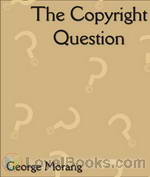 The Copyright Question
The Copyright Question
This is a letter to the Toronto Board of Trade regarding Canadian copyrights. Morang requested an appearance before the Toronto Board of Trade but was denied. This is his letter in response. He wished to make clear his position. | |
By: George Raffalovich (1880-1958) | |
|---|---|
 Ukraine
Ukraine
“We are not the same nation with Russian people,” the statement which all Ukrainians wish to convey to the whole world for centuries. The striving for freedom and independence is what these people shed much of their blood on Ukrainian lands for. “The Ukraine” by Bedwin Sands describes Ukrainian problem, which exacerbated in the late 19th and early 20th centuries, by looking back at the Ukrainian history, the development of Ukrainian literature and its influence, and by considering its relations with Austria and Russia. | |
By: George Washburn Smalley (1833-1916) | |
|---|---|
 Anglo-American Memories
Anglo-American Memories
“These Memories [1911] were written in the first instance for Americans and have appeared week by week each Sunday in the New York Tribune…. they are mainly concerned with men of exceptional mark and position in America and Europe whom I have met, and with events of which I had some personal knowledge. There is no attempt at a consecutive story.” Smalley was an American journalist born in Massachusetts in 1833; he wrote from and about many places in America and Europe. - Summary by Book Preface and David Wales | |
By: George Washington Greene (1811-1883) | |
|---|---|
 Visits To The Dead In The Catacombs Of Rome
Visits To The Dead In The Catacombs Of Rome
This essay of a cultured observer, for many years United States consul in Rome, appeared in Harper's New Monthly Magazine, vol 10, issue 59, April, 1855, pp 577 - 600. | |
By: George Wharton James (1858-1923) | |
|---|---|
 What the White Race May Learn from the Indian
What the White Race May Learn from the Indian
People learn from other people, and races have forever learned from other races. Herein we are treated to an in-depth understanding of categorized social characteristics of the Native American peoples, primarily those of the western U.S. as they existed at the time of book publication . 'In dealing with [the Native Americans] as a race, a people, therefore, I do as I would with my own race, I take what to me seem to be racial characteristics, or in other words, the things that are manifested in the lives of the best men and women, and which seem to represent their habitual aims, ambitions, and desires.' - Summary by Roger Melin & book foreword | |
By: Giacomo Leopardi (1798-1837) | |
|---|---|
 Essays and Dialogues
Essays and Dialogues
"We would no more choose to feed the minds of our countrymen and women with the despairing utterances of the pessimist poet, than we would their bodies with hasheesh. Such melancholy as his clothed in such eloquent words may be the luxury of the idle; it is poison to those who have work to do in the world. It shuts out hope, the very spring of energy; it makes the cheerful steady pursuit of duty a thing utterly beyond human powers. For we can none of us stand alone. Either in human or divine love we must find the mainspring of all life worth living... | |
By: Giles Lytton Strachey (1880-1932) | |
|---|---|
 Eminent Victorians
Eminent Victorians
On Modern Library's list of 100 Best Non-Fiction books, "Eminent Victorians" marked an epoch in the art of biography; it also helped to crack the old myths of high Victorianism and to usher in a new spirit by which chauvinism, hypocrisy and the stiff upper lip were debunked. In it, Strachey cleverly exposes the self-seeking ambitions of Cardinal Manning and the manipulative, neurotic Florence Nightingale; and in his essays on Dr Arnold and General Gordon, his quarries are not only his subjects but also the public-school system and the whole structure of nineteenth-century liberal values. | |
By: Goldsworthy Lowes Dickinson (1862-1932) | |
|---|---|
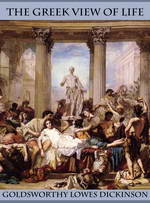 The Greek View of Life
The Greek View of Life
“With the Greek civilisation beauty perished from the world. Never again has it been possible for man to believe that harmony is in fact the truth of all existence.”This elegantly-written work provides a splendid introduction to the Greeks of the classic period: how they thought, wrote, and organised their lives and loves. Although it dates from the 1890s, there is very little about it that has dated. To its author’s credit, the subject of “Greek love” is dealt with in a sane and factual context - despite the judicial assassination of Oscar Wilde going on in the background... | |
By: Grenville Kleiser (1868-1953) | |
|---|---|
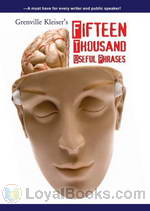 Fifteen Thousand Useful Phrases
Fifteen Thousand Useful Phrases
Fifteen Thousand Useful Phrases is a practical handbook written by Grenville Kleiser. Grenville is known for his writings on humor, positive thinking and inspirational thought. This serves as a handbook of pertinent expressions, striking similes and terms for embellishing speech and literature. This book can be used to improve vocabulary for reading, writing and speaking alike. Through mastery of words, the most powerful and perfect expression of thought can be delivered orally. Choosing the correct words conveys ideas in a crisp and clear way that will hold and audience's attention... | |
By: H. G. Wells (1866-1946) | |
|---|---|
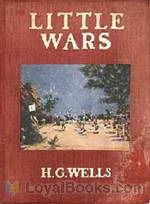 Little Wars (A Game for Boys)
Little Wars (A Game for Boys)
Miniature wargaming got its start with the publication in 1913 of this thoroughly entertaining little account of how H.G. Wells, with certain of his friends, took their childhood toys and turned play into acceptable middle-aged sport by subjecting the exercise to the civilizing influence of actual rules. While wargaming progressed far past these beginnings, Wells observes how “little wars” with even his elementary rules can suggest the wholesale crudity of the real thing. “You have only to play at Little Wars three or four times to realise just what a blundering thing Great War must be... | |
By: H. L. Mencken (1880-1956) | |
|---|---|
 Prejudices, First Series
Prejudices, First Series
Mencken sharpens his pen and in a collection of short essays delivers acerbic opinions on issues and persons of the time. Among his targets in this volume are critics, H.G. Wells Thorstein Veblen, Arnold Bennett, William Dean Howells, Irvin S. Cobb. Mencken's critiques are delivered against a background of his own well known ethnic, racial, religious, and sectional prejudices. Not for the faint of heart, Mencken's prickly, yet unapologetic, prose reveals a window into American attitudes at the time they were written and their influences on the larger American culture. - Summary by DrPGould | |
By: Hamilton Wright Mabie (1846-1916) | |
|---|---|
 Essays on Work and Culture
Essays on Work and Culture
The author investigates the world of work against a backdrop of culture. Each of the 25 essays focuses on one aspect of the topic. For example, the first essay, "Tool or Man?" looks at two views of man. One is that of strength as the provider of security. The other is that of aesthete, as an enthusiast of the arts or academics or religion. In our culture, provider of security is the winner every time. Man as a source of multiple talents cannot be allowed. As the author frames the argument, "Specialisation has been carried so far that it has become an organised tyranny... | |
By: Harl Vincent (1893-1968) | |
|---|---|
 Astounding Stories 02, February 1930
Astounding Stories 02, February 1930
This is the second issue of the classic science fiction Astounding Magazine. It contains the finale of The Beetle Horde by Victor Rousseau, as well as stories by Harl Vincent, Charles Willard Diffin, Hugh B. Cave, Sophie Wenzel Ellis, Sterner St. Paul, Anthony Pelcher and Captain S. P. Meek. | |
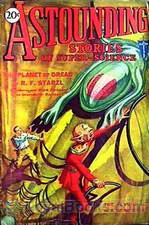 Astounding Stories 08, August 1930
Astounding Stories 08, August 1930
Issue eight of this seminal science-fiction magazine CONTENTS Murder Madness by Murray Leinster - the conclusion of this novel Earth the Maurader by Arthur J. Burks - Part 2 of a 3 Part novel as well as short Stories The Planet of Dread by R.F. Starxl, The Lord of Space by Victor Rousseau, The Second Satellite by Edmund Hamilton, Silver Dome by Harl Vincent and The Flying City by H. Thompson Rich | |
 Astounding Stories 10, October 1930
Astounding Stories 10, October 1930
Issue no. 10 of the magazine brings you:- Stolen Brains by Captain S.P. MeekThe Invisible Death by Victor Rousseau Prisoners on the Electron by Robert H. Leitfred Part 2 of Jetta of the Lowlands by Ray Cummings An Extra Man by Jackson Gee along with the Readers' Corner and interesting scientific facts | |
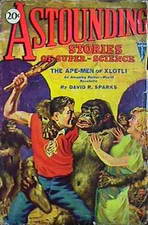 Astounding Stories 12, December 1930
Astounding Stories 12, December 1930
This issue includes "Slaves of the Dust" by Sophie Wenzel Ellis, Part B of "The Pirate Planet" by Charles W. Diffin, "The Sea Terror" by Captain S. P. Meek, "Gray Denim" by Harl Vincent, and "The Ape-Men of Xlotli" by David R. Sparks. | |
By: Harriet Martineau (1802-1876) | |
|---|---|
 Life in the Sick-room: Essays by an Invalid
Life in the Sick-room: Essays by an Invalid
Thinking she would be ill for the rest of her life, Harriet Martineau wrote these partly autobiographical essays about life in the sickroom. Considered ground breaking, it asserted that the sickroom is the sick person's place and not the doctor's. Sick people were able and willing to decide what is best for them. In England and abroad, people declared that "a sick person cannot write a healthy book" and that Harriet Martineau was definitely out of her senses. It would be interesting to see how much has changed. - Summary by Stav Nisser and Wikipedia. | |
By: Harry Bates, Editor | |
|---|---|
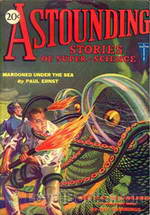 Astounding Stories of Super-Science, September 1930
Astounding Stories of Super-Science, September 1930
This is a collection of short science fiction stories by various writers, circa 1930. Writers include Paul Ernst, Miles Breuer, Ray Cummings, Sewell Wright, and others. | |
By: Helen Keller (1880-1968) | |
|---|---|
 The World I Live In
The World I Live In
The World I Live In by Helen Keller is a collection of essays that poignantly tells of her impressions of the world, through her sense of touch, smell, her imagination and dreams. My hand is to me what your hearing and sight together are to you. In large measure we travel the same highways, read the same books, speak the same language, yet our experiences are different. All my comings and goings turn on the hand as on a pivot. It is the hand that binds me to the world of men and women. The hand is my feeler with which I reach through isolation and darkness and seize every pleasure, every activity that my fingers encounter... | |
 Optimism, An Essay
Optimism, An Essay
Though blind, deaf, and left-handed too, it seemed nothing could hold Helen Keller back. For her graduation from Radcliffe College in 1903, this 23 year old idealistic, charming, ever-striving, pampered young essayist wrote: "I find myself looking forward with beating heart and bright anticipations to what the future holds for me. My share in the work of the world may be limited; but the fact that it is work makes it precious." She concludes, "America is confronted with the mighty task of assimilating all the foreigners that are drawn together from every country, and welding them into one people with one national spirit... | |
By: Henrietta Elizabeth Marshall (1867-1941) | |
|---|---|
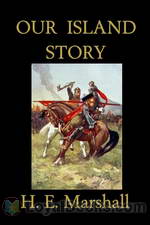 Our Island Story
Our Island Story
Tailored specially to make history more palatable and interesting to children, Our Island Story, by Henrietta Elizabeth Marshall, is a charmingly illustrated volume that promises hours of delight for parents as well as children. Beginning with the myths and legends about Albion, the author ensures that she captivates the child's imagination from the very first page. Unlike today's dry and non-committal history tomes that are prescribed in schools, Our Island Story is full of lyrical prose, literary allusions, heroic and tragic characters, the hunger for power and the glory of empire... | |
By: Henry Clement Notcutt (1865-1935) | |
|---|---|
 Interpretation of Keats's Endymion
Interpretation of Keats's Endymion
Endymion is the largest work by John Keats and was composed between April and November 1817. When it was published in April 1818 the critical reception was almost universally hostile. Since that time, many readers have found the poem dense and inaccessible, and have preferred to focus on the occasional gems of poetic commentary for which it has become famous. Feeling that the poem was both undervalued and misunderstood, in 1919 Professor Clement Notcutt published a lengthy essay, which could be considered a “user’s guide” to Endymion... | |
By: Henry David Thoreau (1817-1862) | |
|---|---|
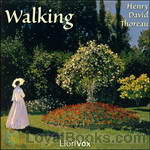 Walking
Walking
This was originally a lecture given by Thoreau in 1851 at the Concord lyceum titled “The Wild” . He revised it before his death and it was included as part of the June 1862 edition of Atlantic Monthly. This essay appears, on the surface, to be simply expounding the qualities of Nature and man’s place therein. Through this medium he not only touches those subjects, but with the implications of such a respect for nature, or lack thereof. | |
 Walking (Version 2)
Walking (Version 2)
This was originally titled "The Wild" and is a lecture given by Thoreau in 1851 at the Concord lyceum. "Walking" is an essay that explores the relationship between man and nature, trying to find a balance between society and our raw animal nature. | |
By: Henry L. Mencken | |
|---|---|
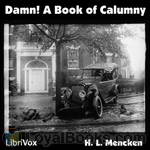 Damn! A Book of Calumny
Damn! A Book of Calumny
Henry Louis “H. L.” Mencken (1880 – 1956) was an American journalist, essayist, magazine editor, satirist, acerbic critic of American life and culture, and a student of American English. Known as the “Sage of Baltimore”, he is regarded as one of the most influential American writers and prose stylists of the first half of the 20th century. Mencken is perhaps best remembered today for The American Language, a multi-volume study of how the English language is spoken in the United States, and for his satirical reporting on the Scopes trial, which he named the “Monkey” trial.” | |
By: Henry Parker Manning (1859-1956) | |
|---|---|
 Fourth Dimension Simply Explained
Fourth Dimension Simply Explained
In January 1909 a friend of the Scientific American paid the sum of 500$ which was to be awarded as a prize for the best popular explanation of the Fourth Dimension. The object being to set forth in an essay not longer than 2500 words the meaning of the term so that the lay reader could understand it. 245 essays were submitted, the 500$ prize was awarded to Lieut.-Col. Graham Denby Fitch, Corps of Engineers, USA, and the essay was published in the Scientific American of July 3rd 1909. Despite the character of the subject, extraordinary interest was manifested in the contest... | |
By: Henry Salt (1851-1939) | |
|---|---|
 Logic of Vegetarianism
Logic of Vegetarianism
With clear logic and entertaining dialogues, the author presents many reasons for a vegetarian rather than a “flesh-eating” diet, and his arguments for not eating meat are as compelling today as when they were written. (Lee Smalley ) | |
By: Henry W. Lucy (1845-1924) | |
|---|---|
 Faces and Places
Faces and Places
Faces and Places is a collection of articles on nineteenth century travel, events and personalities by the British journalist Henry Lucy, who wrote for the Daily News, a London newspaper. His open letter To Those About to Become Journalists rings as true today as when it was written.The first article, “Fred” Burnaby, includes a lively account of a balloon trip, while Night and Day on the Cars in Canada and Easter on Les Avants relate Lucy’s experiences of rail travel at that time. Other travel tales (A Night on a Mountain, Mosquitoes and Monaco, and Oysters and Arcachon) provide an insight into the Victorian Englishman’s attitude to Europe... | |
By: Herbert Allen Giles (1845-1935) | |
|---|---|
 Chinese Sketches
Chinese Sketches
Herbert Giles was in the diplomatic service in China from 1867 to 1893. His frank observations on Chinese culture and people form the basis of these short essays, published in 1876. On his retirement, he returned to England and served as the Chair of Chinese at Cambridge for 35 years. | |
By: Herbert W. Collingwood (1857-1927) | |
|---|---|
 Hope Farm Notes
Hope Farm Notes
“Most of these notes were originally printed in the Rural New-Yorker from week to week and covering a period of about 20 years. . . . From the very first the object of these notes has been to picture simply and truthfully the brighter, cheerful side of Farm Life.” Herbert W. Collingwood gives us a delightful collection of essays reflecting his homespun wisdom and wit from the rural setting of the farm in early twentieth century America. He touches on subjects from baseball to Christmas, all reflecting his treasured values of home and family. - Summary by Larry Wilson | |
By: Hilaire Belloc | |
|---|---|
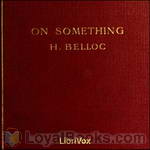 On Something
On Something
“Now that story is a symbol, and tells the truth. We see some one thing in this world, and suddenly it becomes particular and sacramental; a woman and a child, a man at evening, a troop of soldiers; we hear notes of music, we smell the smell that went with a passed time, or we discover after the long night a shaft of light upon the tops of the hills at morning: there is a resurrection, and we are refreshed and renewed.” – Hilaire Belloc | |
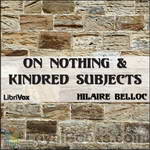 On Nothing & Kindred Subjects
On Nothing & Kindred Subjects
“I knew a man once, Maurice, who was at Oxford for three years, and after that went down with no degree. At College, while his friends were seeking for Truth in funny brown German Philosophies, Sham Religions, stinking bottles and identical equations, he was lying on his back in Eynsham meadows thinking of Nothing, and got the Truth by this parallel road of his much more quickly than did they by theirs; for the asses are still seeking, mildly disputing, and, in a cultivated manner, following the... | |
 This, That, and the Other
This, That, and the Other
“When Fame comes upon a man well before death then must he most particularly beware of it, for is it then most dangerous. Neither must he, having achieved it, relax effort nor (a much greater peril) think he has done his work because some Fame now attaches thereto.” -- Hilaire Belloc | |
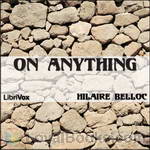 On Anything
On Anything
"Long before I knew that the speech of men was misused by them and that they lied in the hearing of the gods perpetually in those early days through which all men have passed, during which one believes what one is told, an old and crusty woman of great wealth, to whom I was describing what I intended to do with life (which in those days seemed to me of infinite duration), said to me, ( You are building castles in Spain.' I was too much in awe of this woman not on account of the wealth, but on account... | |
 On Everything
On Everything
Hillaire Belloc of French by birth, British by naturalization was a diverse and prolific writer of the early 20th century. His writing runs the range from poetry, political writings and children’s stories. He was a close friend, and sometimes collaborator with fellow Catholic G.K. Chesterton. This book is a collection of essays and other short writings on a vast array of subjects ranging from observations on the barber, the duel, reflections on war and religion. Some are in the form of drama, dialogue and letters but always engaging with wit and satire. - Summary by Larry WilsonProof-listened by LynnJM and ADKreader | |
 On
On
Hilaire Belloc, French by birth, British by naturalization, was a diverse and prolific writer of the early 20th century. His writing runs the range from poetry, political writings and children’s stories. He was a close friend, and sometimes collaborator with fellow Catholic G.K. Chesterton. This book is a collection of essays and other short writings on a vast array of subjects ranging from observations on Bad Verse and Mumbo-Jumbo to Sailing the Seas and Hatred of Numbers. - Summary by Larry Wilson | |
By: Ida B. Wells-Barnett (1862-1931) | |
|---|---|
 Southern Horrors: Lynch Law In All Its Phases
Southern Horrors: Lynch Law In All Its Phases
Thoroughly appalled and sickened by the rising numbers of white-on-black murders in the South since the beginning of Reconstruction, and by the unwillingness of local, state and federal governments to prosecute those who were responsible, Ida Bell Wells-Barnett wrote Southern Horrors, a pamphlet in which she exposed the horrible reality of lynchings to the rest of the nation and to the world. Wells explained, through case study, how the federal government's failure to intervene allowed Southern states... | |
By: Irvin S. Cobb (1876-1944) | |
|---|---|
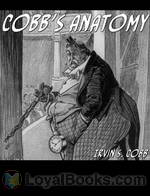 Cobb's Anatomy
Cobb's Anatomy
Irvin Shrewsbury Cobb was born on June 23, 1876. At seventeen years of age, he began writing for the Paducah Daily News, his hometown paper. At nineteen he became the managing editor; up to that point, our nation’s youngest. He worked as a columnist, a humorist and an author. But ‘horror,’ and ’short stories,’ are not why he is remembered. He is remembered because he was, and still is, funny. And although he is now dead–he died March 11, 1944–this work “Cobb’s Anatomy,” among others, has left an indelible mark upon mankind: a smile. | |
By: Isabella L. Bird (1831-1904) | |
|---|---|
 A Lady's Life in the Rocky Mountains
A Lady's Life in the Rocky Mountains
Isabella Bird began travelling while in her early twenties to help alleviate illness that had plagued her since childhood. She was a single woman in her early forties when she made her treck through the Rocky Mountains. A Lady’s Life in the Rocky Mountains details this fascinating account of her travels through a series of letters written to her sister, Henrietta. These letters are filled with beautiful, vivid descriptions of the scenery, the people she encountered, the way of life, and a mountain man named Jim Nugent, that was as rough as they come, but a complete gentleman with Ms... | |
By: Izaak Walton (1593-1683) | |
|---|---|
 The Compleat Angler
The Compleat Angler
The Compleat Angler is a celebration of the art and spirit of fishing in prose and verse. Walton did not profess to be an expert with the fly, but in the use of the live worm, the grasshopper and the frog "Piscator" could speak as a master. There were originally only two interlocutors in the opening scene, "Piscator" and "Viator"; but in the second edition, as if in answer to an objection that "Piscator" had it too much in his own way in praise of angling, he introduced the falconer, "Auceps," changed "Viator" into "Venator" and made the new companions each dilate on the joys of his favourite sport. | |
By: Jack London (1876-1916) | |
|---|---|
 Valley of the Moon
Valley of the Moon
The novel Valley of the Moon is a story of a working-class couple, Billy and Saxon Roberts, struggling laborers in Oakland at the Turn-of-the-Century, who left the city life behind and searched Central and Northern California for a suitable farmland to own. The book is notable for the scenes in which the proletarian hero enjoys fellowship with the artists' colony in Carmel, and he settles in the Valley of the Moon. | |
By: Jack Williamson (1908-2006) | |
|---|---|
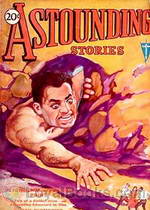 Astounding Stories 15, March 1931
Astounding Stories 15, March 1931
This issue includes "When the Mountain Came to Miramar" by Charles W. Diffin, "Beyond the Vanishing Point" by Ray Cummings, "Terrors Unseen" by Harl Vincent, the conclusion of "Phalanxes of Atlans" by F. V. W. Mason, and "The Meteor Girl" by Jack Williamson. | |
By: James Allen (1864-1912) | |
|---|---|
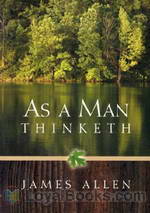 As a Man Thinketh
As a Man Thinketh
“A man is literally what he thinks, his character being the complete sum of all his thoughts,” is one of the quotes from James Allen's classic self help books, As a Man Thinketh. Published in 1902, it provides many more such insightful concepts on the power of thought and its effect on a human being's personality and behavior. This volume is more of a literary essay than a complete book and its title is based on a Biblical proverb, “As a man thinketh in his heart, so is he.” Taking this piece of ancient wisdom further, James Allen explores the far-reaching effects of the inner workings of a person's mind and motivation... | |
By: James Elroy Flecker (1884-1915) | |
|---|---|
 Collected Prose
Collected Prose
Best remembered for his poetry, James Elroy Flecker was also a playwright, novelist and prose writer. This collection of his idiosyncratic prose writings includes The Last Generation (a short science fiction story), short sketches, a dialogue, and several critical studies. | |
By: James Huneker (1857-1921) | |
|---|---|
 Unicorns
Unicorns
An engaging collection of essays about artists, composers, writers, and, of course, unicorns. - Summary by Stav Nisser | |
By: Jane Austen (1775-1817) | |
|---|---|
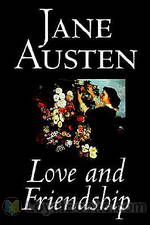 Love and Friendship
Love and Friendship
Begun when she was just eleven years old, Love and Friendship is one of Jane Austen's stories that very few readers may have encountered before. Austen experts feel that this story was written, like many others, only for the pleasure of her family and friends. It is scribbled across three notebooks, in childish handwriting, and the complete work is thought to have been written over a period of six or seven years. It is dedicated to one of her cousins, whom she was very close to, Eliza de Feuillide... | |
By: Jane Collier (1714-1755) | |
|---|---|
 Essay on the Art of Ingeniously Tormenting
Essay on the Art of Ingeniously Tormenting
An Essay on the Art of Ingeniously Tormenting was a conduct book written by Jane Collier and published in 1753. The Essay was Collier's first work, and operates as a satirical advice book on how to nag. It was modelled after Jonathan Swift's satirical essays, and is intended to "teach" a reader the various methods for "teasing and mortifying" one's acquaintances. It is divided into two sections that are organised for "advice" to specific groups, and it is followed by "General Rules" for all people to follow. | |
By: Jean-Jacques Rousseau (1712-1778) | |
|---|---|
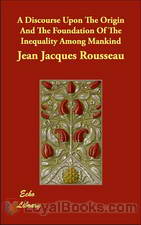 A Discourse Upon the Origin and the Foundation of the Inequality Among Mankind
A Discourse Upon the Origin and the Foundation of the Inequality Among Mankind
This work presents Rousseau’s belief in the profoundly transformational effects of the development of civilization on human nature, which Rousseau claims other political philosophers had failed to grasp. Specifically, before the onset of civilization, according to Rousseau, natural man lived a contented, solitary life, naturally good and happy. It is only with the onset of civilization, Rousseau claims, that humans become social beings, and, concomitant with their civilization, natural man becomes corrupted with the social vices of pride, vanity, greed and servility. | |
By: Jerome K. Jerome (1859-1927) | |
|---|---|
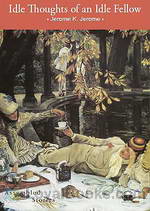 Idle Thoughts of an Idle Fellow
Idle Thoughts of an Idle Fellow
Idle Thoughts of an Idle Fellow, published in 1886, is a collection of humorous essays by Jerome K. Jerome. It was the author’s second published book and helped establish him as a leading English humorist. The book consists of 14 independent articles arranged by themes. | |
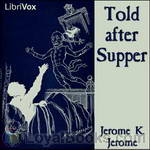 Told after Supper
Told after Supper
It is Christmas Eve, and the narrator, his uncle and sundry other local characters are sitting round the fire drinking copious quantities of whisky punch and telling ghost stories until bedtime, when… But no, I won’t spoil the fun. This is a little gem: Jerome at his tongue-in-cheek best. | |
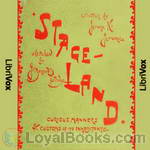 Stage Land
Stage Land
A comic look at the curious habits and customs of the inhabitants of ‘Stage Land’. Dedicated to ‘that highly respectable but unnecessarily retiring individual, of whom we hear so much but see so little, “the earnest student of drama” | |
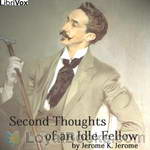 Second Thoughts Of An Idle Fellow
Second Thoughts Of An Idle Fellow
A second volume of humorous essays on various subjects, following the success of Idle thoughts Of An Idle Fellow. | |
By: Jessie Benton Frémont | |
|---|---|
 The Will and the Way Stories
The Will and the Way Stories
Simply put, this is a book of 9 short vignettes each of which describes a different scenario which demonstrates the age old adage: 'where there's a will, there's a way'. | |
By: Johann Wolfgang von Goethe (1749-1832) | |
|---|---|
 Essays on Art
Essays on Art
Essays on art, letters, thoughts, aphorisms - Goethe's thoughts were dealing with artworks of every branch of arts. He addressed many aspects of the artistic process and described his impressions of works of arts - and even dilettantism - in his essays. Being one of the great masters of german written arts, Goethe used his own skills to express his thoughts: while Section 25 is more of a commented list of pictures in a gallery, two other sections are dramatic readings. Furthermore there are letters, talks and thoughts to entertain - I hope, these essays may function as a worthy treasure-chest for the interested... | |
By: John Addington Symonds (1840-1893) | |
|---|---|
 A Problem in Modern Ethics
A Problem in Modern Ethics
“Society lies under the spell of ancient terrorism and coagulated errors. Science is either wilfully hypocritical or radically misinformed.” John Addington Symonds struck many an heroic note in this courageous (albeit anonymously circulated) essay. He is a worthy Virgil guiding the reader through the Inferno of suffering which emerging medico-legal definitions of the sexually deviant were prepared to inflict on his century and on the one which followed. Symonds pleads for sane human values in... | |
By: John Bunyan (1628-1688) | |
|---|---|
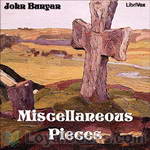 Miscellaneous Pieces
Miscellaneous Pieces
John Bunyan (November 28, 1628 – August 31, 1688), a Christian writer and preacher, was born at Harrowden (one mile south-east of Bedford), in the Parish of Elstow, England. He wrote The Pilgrim’s Progress, arguably the most famous published Christian allegory. In the Church of England he is remembered with a Lesser Festival on 30 August. Bunyan became a popular preacher as well as a prolific author, though most of his works consist of expanded sermons. In theology he was a Puritan, but there was nothing gloomy about him. The portrait his friend Robert White drew, which has often been reproduced, shows the attractiveness of his true character. | |
By: John Burroughs (1837-1921) | |
|---|---|
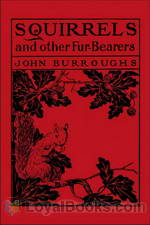 Squirrels and other Fur-Bearers
Squirrels and other Fur-Bearers
Squirrels and other Fur-Bearers, a collection of essays by American naturalist and essayist, John Burroughs, provides fascinating insight into the daily life of small woodland creatures. Included in these essays are Burrough’s personal observations of squirrels, rabbits, mink, and chipmunks, as well as numerous other small mammals. Highly recommended for anyone, both young and old, with an interest in nature and wildlife! | |
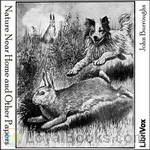 Nature Near Home and Other Papers
Nature Near Home and Other Papers
Nature Near Home is one of many books on natural history by John Burroughs. It is full of simple observations about rural scenes and charming stories about animals, plants, and even people! Burroughs loves the creatures around him and derives great pleasure from his walks and studies in nature’s scenes. | |